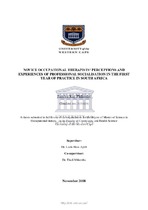Novice occupational therapists’ perceptions and experiences of professional socialisation in the first year of practice in South Africa
Abstract
Professional socialisation is a key dimension within the professional development of an occupational therapy practitioner. Professional socialisation in the first year of practice involves a process of change within the individual with regards to knowledge, skills and reasoning. The process further involves the novice’s developmental induction into the culture of the profession and into the practice context. Novice practitioners who are not appropriately supported in their professional socialisation process may become demoralised as practitioners. It is necessary to explore professional socialisation from the perspectives of novice occupational therapy practitioners themselves, in order to generate an understanding of how professional socialisation can be supported in the first year of practice. This is of vital importance otherwise the profession may run the risk of attrition. Therefore, the aim of this study was to explore and describe novice occupational therapists’ perceptions and experiences regarding professional socialisation during the first year of practice. A qualitative research approach and exploratory descriptive research design was utilised in the public health system in South Africa. Purposive sampling was utilised to select nine participants for the study. Data collection methods included two semi-structured interviews and a dyad interview discussion which were audio-recorded, transcribed verbatim and analysed through thematic data analysis. The strategies of member checking, peer review, reflexivity, and an audit trail ensured trustworthiness of the study. Ethics clearance was obtained from the UWC Research Committee. Three themes originated from the findings of this study. The first theme, stepping into the unknown, illustrates a dissonance between the participants’ expectations for practice and the actual realities of practice that they encountered. The second theme, uncovering the occupational therapy culture, highlights power dynamics and inconsistencies within the profession as perceived by the participants. The third theme, becoming a professional, highlights how the participants responded to the challenge of transitioning from student to professional and started to internalise their professional identity. Recommendations to support the professional socialisation of novice therapists in the South African context are made in respect of occupational therapy education, continued professional development, support for novice therapists, transformation in the profession and future research.

